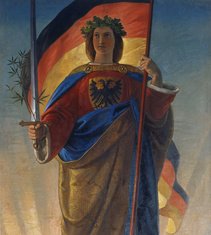|
Question or Term
|
Answer
|
|
An 1859 war in which France and Sardinia defeated Austria in no small part due to a prolonged lack of military investment and reform, the latter losing much of its Italian territory
|
Second Italian War of Independence
|
|
The geographic divide within Germany in which the north was Protestant while the south remained Roman Catholic, complicating efforts for German unification
|
North-South
|
|
The conservative Minister President of Prussia from 1850 to 1858 who believed the best way to avoid revolution was to improve the living conditions of peasants and workers, thus prompting sweeping social reforms
|
Baron Otto von Manteuffel (1805 - 1882)
|
|
A term used by Karl Marx to refer to the middle classes, usually capitalists, manufacturers, and employers
|
Bourgeoisie
|
|
Identification with one's nation which is held central to all political activity and decision making
|
Nationalism
|
|
That Prussian dominated union left by some German states such as Saxony and Hanover over the failure of other German states to join it and Austrian opposition against it
|
Erfurt Union
|
|
He who considered liberalism and nationalism to be the forces of destruction
|
Prince Klemens von Metternich (1773 - 1859)
|
|
That system introduced in 1848 for elections in Prussia in which men aged 21 or over were split into three classes, equal in the amount of tax revenue they paid, elected a third of the Parliament each, with 4.7% of the population in the first class, 12.7% in the second, and 82.6% in the third
|
Three Class System
|
|
An 1840 crisis in which France demanded all that German Confederation territory west of the River Rhine, sparking nationalist fervour amongst German states
|
Rhine Crisis
|
|
The emperor of Austria who issued two manifestos in May and June 1848 which would have transformed the country's Imperial Diet into a directly elected Constituent Assembly
|
Ferdinand I (1793 - 1875)
|
|
|
Question or Term
|
Answer
|
|
Those geographic areas of high population density within the German states in which the 1848 Revolutions were centred
|
Urban areas
|
|
An 1849 proposal by Austrian Minister President Prince Felix of Schwarzenberg to establish a customs union between Austria and the Zollverein which - like his later 1851 proposal for a customs union of German states then outside the Zollverein - failed to materialise
|
Zollunion
|
|
The city in which the few remaining members of the Frankfurt Parliament were finally forcibly dispersed from by the Prussian military in June 1849, having been ejected from Frankfurt earlier in the year after the widespread rejection of the Paulskirche Constitution
|
Stuttgart
|
|
A pre-parliament formed by 51 representatives of 6 German states in Heidelberg that prepared the way for a permanent German-wide parliament during the 1848 Revolutions, passing a resolution for an all-German National Assembly in April as well as some democratic reforms
|
Vorparlament
|
|
The proportion by which Prussian foreign trade, railway building, and industrial development grew in the 1850's due to plentiful resources of chemicals, coal, iron, &c., good education, the Zollverein, and efficient transport networks
|
Double
|
|
The two consecutive years in which the radical liberal Progressive Party gained successively large majorities in the Prussian lower house against a background of constitutional crisis caused by von Roon's Army Reform Bill
|
1861 and 1862
|
|
That nation that was fearful of the rise of German nationalism due to the belief that it could serve as a catalyst to provoke more persistent nationalist demands from the empire's minorities
|
Austrian Empire
|
|
The King of Prussia from 1861 to 1888 - later Emperor of Germany - who was a devout Protestant and absolutist, appointing a joint liberal and conservative ministry on becoming regent in 1858, though allowing it no significant role in government
|
William I (1797 - 1888)
|
|
The King of Prussia from 1840 to 1861, who was famously unstable, his policy fluctuating widely (relaxing then re-imposing censorship, summoning then dissolving the united diet, &c.) though in part to try and balance the competing demands of liberals and Junkers
|
Frederick William IV (1795 - 1861)
|
|
An 1832 festival in which 30,000 people gathered to listen to democratic, and German nationalist orators
|
Hambach Festival
|
|

